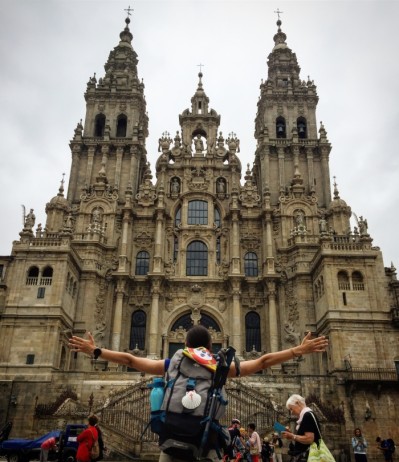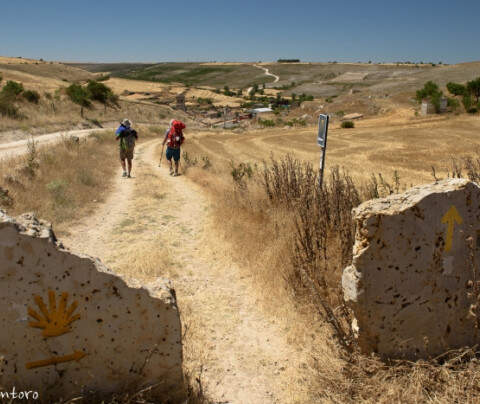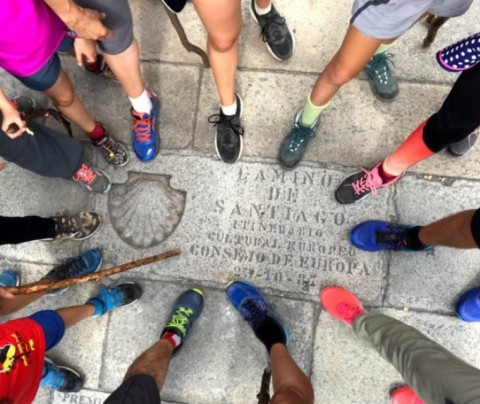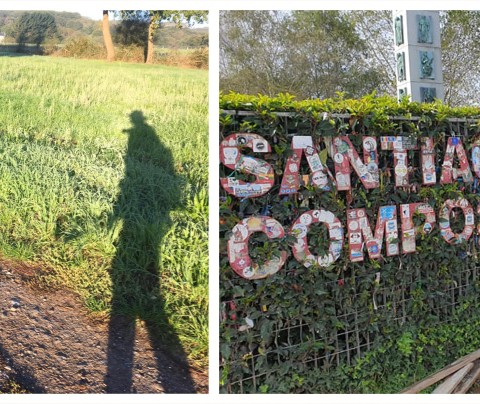Camino de Santiago and Covid-19

WARNING!
All the information in this article refers to the year 2020.
To consult the situation on the Camino in 2021, please consult the post Camino de Santiago and Covid-19.
The Camino de Santiago “reopens” on July 1st. After three and a half months empty, the Jacobean Routes will once again be filled with pilgrims who will direct their steps to Compostela.
The 1st of July is the date set by the Cathedral of Santiago, the Pilgrim's Office and a good part of the public hostels to open their doors, favoring the restart of the Jacobean pilgrimage.
The decision was made yesterday at the meeting of the organizing committee of Xacobeo 2021, in which the Xunta de Galicia, the Santiago City Council and the Archbishopric participate. After the serious health crisis that arose as a result of Covid-19, the commission considers that the conditions are met to guarantee the safety of pilgrims and those who offer services related to the Camino de Santiago.
This ends the uncertainty about the possible return to the Jacobean Routes, which, however, must be carried out with the necessary sanitary security measures.
"We all want pilgrims to return to the Camino de Santiago soon, but the absolute priority is to guarantee safety for those who travel the route, and for the professionals or volunteers who are present on a daily basis," said the Minister of Culture after the commission meeting.
Reopening of public and private hostels
The network of public hostels that depend on the Xunta de Galicia will open gradually from July 1st. The number of establishments and their capacity will be determined by the total supply of places that exist in each municipality of the Camino.
The objective is to guarantee a safe reception for pilgrims, offering a sufficient number of places between public hostels and private accommodation that are also beginning to reopen. Xunta has confirmed that this year public hostels will have a reservation through an app that will be available as soon as possible.
Outside Galicia, communities and municipalities also work to be ready for the month of July. The Association of Municipalities of the Camino de Santiago is working intensively to guarantee a sufficient number of places in municipal and reception hostels. The goal is none other than to guarantee safe reception as soon as the pilgrims return to the Camino.
Private hostels follow the same path. According to Enrique Valentín, president of the Red de Albergues del Camino de Santiago, 70% of the private hostels on the Camino Francés will open their doors in July. And about 90% will do so already in August.
“The establishments are already taking the necessary security measures to guarantee the safety of pilgrims and hospitaliers. Some shelters are adapting, reducing capacity, training hospital workers to prevent Covid-19 infections and taking all the necessary hygienic measures, "explains Enrique Valentín.
After this first adaptation phase, the hostels will begin to open their doors. Only those shelters that are more delayed in the evolution of the pandemic, such as Castilla y León, will suffer some delay. "But from day 1, the Camino de Santiago will be open," confirms the president of the Red de Albergues.
Take extreme measures to guarantee a “Safe Camino”
The Camino de Santiago will be safer than ever. This is the objective of all the agents involved in the recovery of the Jacobean Routes.
For this reason, the Camino de Santiago will have a preventive manual, a kind of comprehensive protocol that will include all the measures and recommendations that must be carried out in the different services and infrastructures that the pilgrim encounters on the Jacobean Routes.
The manual is prepared in coordination with the Institute for Spanish Tourist Quality (ICTE) and will be validated by the health authorities.
A very important part of this protocol are the measures that the hostels must take into account to guarantee the safety of hospital workers and pilgrims. In fact, the Xunta de Galicia and other autonomous communities are already offering online training courses on hygiene and health security aimed at hostel workers.
Ensuring the safety distance (2 meters), doing a correct and continuous hand washing and establishing a correct ventilation and disinfection are other main measures that you can read in more detail in this article.
The security measures will also affect the reception, in which contact between the hospitalero and the pilgrim will be avoided. Electronic registration should be prioritized (the hospital operator will not manipulate the DNI or passport), as well as online booking and card payment. When sealing the Credential you will also have to be very scrupulous, performing a correct disinfection of the seal.
The capacity must be reduced, the separation between beds and bunk beds will have to be 2 meters and the pilgrim himself will make his bed with individual lingerie. Common use areas, key on the Camino de Santiago, will also have restrictions and, in some cases, such as community kitchens, could be closed.
In order to correctly guide the hostels in the adoption of these measures, a network of “safe hostels” has been set up by the Association of Municipalities of the Camino de Santiago. The AMCS will provide a list of the participating establishments that will also receive technical advice to adapt and comply with the requirements that have been included in a specific manual.
Visits to the Cathedral and collection of the Compostela
The Cathedral of Santiago will also reopen its doors on July 1st, as well as the Pilgrim's Office.
People who decide to take the Camino de Santiago will be able to arrive in Santiago from July 1st and collect their Compostela at the Pilgrim's Office, located on Rúa Carretas, following a whole series of security measures.
The visit to the Cathedral may also take place from July 1st, although the daily Pilgrim's Mass will continue to be celebrated in the Church of San Francisco due to the maintenance works on the basilica, which are still ongoing.
Postal Services for the Camino de Santiago
Correos, following the indications given by the Spanish Government, has launched a plan to de-escalate and gradually return to normal activity after the suspension of services caused by Covid-19. This recovery of activity is done by maximizing security measures to protect workers and customers.
Correos services for the Camino de Santiago are available again. The hiring of the Paq Bicicleta, the Paq Peregrino or sending packages can be done at any Post Office.
The hiring of the backpack transport service on the Camino de Santiago is also available. We remind you that the Paq Mochila can be booked through our website and make payment by credit card or Paypal. In this way, you can better plan your route and avoid handling money and unnecessary contacts, as recommended by the Administrations.
Those who have made the reservation for nearby dates and have to suspend the Camino, do not worry. You can cancel the service free of charge up to 24 hours before its starting date. To do this you just have to send us an email at paqmochila@correos.com with the name and the reservation code and we will make the refund.
When will you be able to travel?
July is also the month marked in red to regain mobility and be able to travel.
Within Spain, free movement between territories will be possible as soon as the four phases of de-escalation are over. From there, it will enter a period of "new normality" in which it will be possible to move from one province to another and from one community to another, although with the established security measures: safety distance, mandatory use of a mask, washing of hands...
Regarding international travel and connections, the President of the Government of Spain announced the opening of borders for foreigners starting in July.
However, given the improvement in the data and the evolution of the pandemic, the borders with the Schengen countries will open on June 21. There will be an exception: Portugal, our borders will reopen on July 1, as established.
On July 1, the borders with countries outside the EU are scheduled to be opened, always selectively, depending on their epidemiological situation.
On July 1, the borders with countries outside the EU are scheduled to be opened, always selectively, depending on their epidemiological situation. The EU agreed this Monday, June 29, to authorize the entry of 15 among which are Algeria, Australia, Canada, South Korea, Japan, Georgia, Morocco, Montenegro, New Zealand, Rwanda, Serbia, Thailand, Tunisia and Uruguay .
On the contrary, the European Union maintains the veto over 150 countries, including the United States, Brazil, Mexico, Russia and India. EU countries, including Spain, may maintain the veto to some of them if they consider their epidemiological situation unreliable.
Your email address will not be published.
Mandatory fields are marked with *






